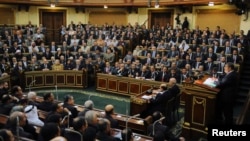CAIRO —
Egypt's highest court has ruled that parliament and the group of lawmakers who wrote the constitution were not legally elected.
In the latest standoff between Egypt's judiciary and the nation's Islamist government, the constitutional court says the nation's Shura Council was elected under flawed election laws. But it ruled the body will stay seated until new elections are held.
Shura members are Egypt's sole lawmakers, after the high court last year ordered the lower house, traditionally the more influential body, disbanded.
The court also ruled against the 100-member constitutional drafting panel, but it was not immediately clear what effect it would have on the document itself. The lawmakers' draft won approval in a national referendum last year, despite violent opposition to both the laws themselves and the process by which they were adopted.
Political analyst and publisher Hisham Kassem argues the ruling should make the constitution null and void.
"The fact that it went to a national referendum does not give it legitimacy if initially the formation of the committee which drafted the constitution was in violation with the constitution and in violation of law," said Kassem.
There was no immediate comment from the office of President Mohamed Morsi, who claimed extraordinary powers to see the constitution pushed through quickly, in part because of fears the court would disband parliament last year.
The rulings are the latest in a series of challenges lobbed back and forth between the government and Egypt's judiciary, which enjoyed a measure of respect under the old government as an independent body. Morsi administration officials accuse the court of being filled with holdovers of the old system trying to undermine Egypt's political transition.
Analyst Kassem says the judiciary continues to enjoy support among others.
"We insist on the rule of law and due process even if the [Muslim] Brotherhood claimed that they are being politically targeted by the judiciary," said Kassem.
The court decided Sunday in the case of the upper house and last year in the case of the lower house that political parties had unfairly fielded candidates in races for the one third of seats meant to be reserved for independent candidates. Both elections saw Islamist politicians dominate their respective chambers.
In the latest standoff between Egypt's judiciary and the nation's Islamist government, the constitutional court says the nation's Shura Council was elected under flawed election laws. But it ruled the body will stay seated until new elections are held.
Shura members are Egypt's sole lawmakers, after the high court last year ordered the lower house, traditionally the more influential body, disbanded.
The court also ruled against the 100-member constitutional drafting panel, but it was not immediately clear what effect it would have on the document itself. The lawmakers' draft won approval in a national referendum last year, despite violent opposition to both the laws themselves and the process by which they were adopted.
Political analyst and publisher Hisham Kassem argues the ruling should make the constitution null and void.
"The fact that it went to a national referendum does not give it legitimacy if initially the formation of the committee which drafted the constitution was in violation with the constitution and in violation of law," said Kassem.
There was no immediate comment from the office of President Mohamed Morsi, who claimed extraordinary powers to see the constitution pushed through quickly, in part because of fears the court would disband parliament last year.
The rulings are the latest in a series of challenges lobbed back and forth between the government and Egypt's judiciary, which enjoyed a measure of respect under the old government as an independent body. Morsi administration officials accuse the court of being filled with holdovers of the old system trying to undermine Egypt's political transition.
Analyst Kassem says the judiciary continues to enjoy support among others.
"We insist on the rule of law and due process even if the [Muslim] Brotherhood claimed that they are being politically targeted by the judiciary," said Kassem.
The court decided Sunday in the case of the upper house and last year in the case of the lower house that political parties had unfairly fielded candidates in races for the one third of seats meant to be reserved for independent candidates. Both elections saw Islamist politicians dominate their respective chambers.




